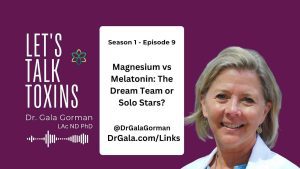Imagine you’re climbing a mountain. The path is steep and rocky, the air thin. You’re tired, your backpack heavy, and the peak is nowhere in sight.
Actually, I don’t have to imagine it. This was my experience hiking over the Pyrenees from France to Spain. And, even when you reach the peak, you’re not “there” yet.
This can be a lot like menopause fatigue. You’re navigating a new and challenging landscape, one that can leave you feeling exhausted, overwhelmed, and at times, a little lost. It’s not easy.
But what if I told you it doesn’t have to be so hard? Understanding why your body is acting the way it is, and what you can do about it, could help you find your way back to vitality.
Dr. Gala’s Quick Take
Yes, it is necessary to understand how menopause triggers fatigue and to adopt natural healing methods for relief. This awareness motivates women to get through this life phase with grace and find comfort in gentle, effective strategies.

While it may seem daunting, understanding menopause fatigue is the first step to managing it, empowering you to regain control over your energy levels and overall well-being. Many women experience feelings of fatigue during menopause, characterized by unrelenting exhaustion that can impact energy, motivation, and overall quality of life.
This is largely due to fluctuations in hormone levels, specifically estrogen, which can disrupt sleep patterns and cause hot flashes. Knowledge is power and recognizing these symptoms of menopause gives you the awareness to make changes. Consider introducing dietary adjustments, regular exercise, and even exploring stress relief techniques.
Your physical and emotional health is paramount. And, lifestyle strategies can be your secret weapon against menopause fatigue. Establish a healthy sleep routine, manage your stress, stay hydrated, and consider herbal remedies.
You have the power to manage this phase of your life. Empower yourself with knowledge, take action, and restore your energy. Remember, menopause is a natural process, not a life sentence, and you have the strength to navigate through it.
Common Symptoms of Fatigue

You’re not alone if you’re finding yourself waking up in the middle of the night due to hot flashes, racing heart, and anxiety, or the need for regular bathroom trips. These are common symptoms of menopause fatigue. Many women experience these and other symptoms, like irritability, difficulty concentrating, and frequent hunger.
Fatigue during menopause can feel overwhelming. The hormonal fluctuations causing these symptoms are a natural part of life. You’re in control, and there are steps you can take to mitigate these symptoms.
Consider pacing your day, using herbal extracts like red clover, ashwagandha, and black cohosh, or stabilizing your blood sugar levels through regular, healthy high-protein snacking. Establishing a pre-sleep routine can also improve your sleep quality.
You have the power to manage your menopausal symptoms. It’s not easy, but with knowledge, you can navigate this period in your life. Remember, menopause is just a phase, not a lifetime.
You’ve got this, and you’re not alone.
In my book, “What’s Your Kryptonite?” I encourage readers to take good care of themselves. You’re your best PCP … primary care person … and you’re worth it.
Hormonal Fluctuations and Fatigue
Now that we’ve explored the common symptoms of menopause fatigue, let’s understand how hormonal fluctuations during this phase can significantly contribute to your fatigue. During the menopausal transition, your body experiences a rollercoaster of hormonal changes, particularly in estrogen and progesterone, affecting your energy levels and metabolism.
These fluctuations can result in poor sleep quality, made worse by night sweats and hot flashes … leaving you feeling drained. Recognizing these menopause symptoms is the first step to reclaiming your power. There are solutions to manage this fatigue.
A nutrient-dense diet, regular exercise, and quality sleep can help mitigate these symptoms. Some may consider hormone replacement therapy (HRT). HRT, a form of hormone therapy should be a “last resort” solution due to its risks and unwanted side effects.
The journey through menopause may be challenging, but with the right tools and mindset, you can manage your symptoms and continue to lead a vibrant, powerful life.
Stress and Menopause Fatigue
Although menopause can feel like an uphill battle, it’s important to know that chronic stress during this transition can significantly contribute to your fatigue and impact your overall well-being. The hustle and bustle of daily life, coupled with the hormonal shifts, can lead to mood swings, brain fog, and a heightened sense of fatigue during menopause.
High levels of cortisol, a stress hormone, disrupt your sleep and leave you feeling tired even after a rare night of sound sleep. You can manage this stress. Incorporate relaxation techniques into your routine, exercise regularly, and find social support from women in this phase of life too. Others understand what you’re dealing with … and can provide the comfort and encouragement you need.
Learning to manage stress is an invaluable life skill. I created a process I call the MOLT Method™ to help women reverse the effects of chronic stress. If we begin the transition through menopause already chronically tired and stressed, it’s no wonder symptoms start emerging when the stress of menopause joins the party. If you like to shed some stress with me, consider joining me in MOLT.
You may need the help of a professional psychotherapist. Cognitive-behavioral therapy can be incredibly beneficial. Recognizing the impact of stress on your menopause fatigue is the first step towards developing effective coping strategies. You’re more than capable of improving your quality of life during this transition.
Dietary Impact on Fatigue
Navigating through menopause, it’s essential to understand the profound impact your diet can have on managing fatigue. With the right choices, you can significantly enhance your energy levels and overall well-being.
Incorporating foods high in soy and protein like tofu or edamame, into your meals can help maintain hormonal balance and alleviate fatigue. Protein is your best friend as you age. You need to consume 20 to 30 grams of protein with every meal. That’s a minimum of 50 grams of protein daily.
Avoid food and drink that can disrupt your sleep and cause energy crashes, like caffeine and alcohol. Instead, focus on a diet rich in fruits, vegetables, and lean proteins. Staying well-hydrated is also key in managing fatigue.
If your diet is deficient (most are), you will need to supplement with what I refer to as “food enhancement.” But, I don’t recommend taking ANY supplement long-term for a number of reasons. In the short-term, they can be helpful while you’re improving your diet.
Sleep Quality and Menopause

Experiencing menopause often means grappling with a significant decline in sleep quality. Hormonal fluctuations can disrupt your sleep patterns and lead to conditions like insomnia and night sweats. Don’t let this intimidate you. As a powerful, menopausal woman, you can take control of your sleep problems.
Hot flashes and night sweats may keep you awake, but by creating a comfortable sleep environment and sticking to a consistent sleep schedule, you can encourage normal sleep. Consider limiting caffeine and avoiding alcohol at least 3 hours before bedtime. Some need to avoid caffeine past noon. These steps contribute to better sleep quality and menopause becomes less of a sleep thief.
And, remember, engaging in regular exercise and exploring herbal remedies, such as black cohosh and valerian, may further improve your sleep quality.
Menopause is a phase, not a full stop. Each step you take towards improving your sleep quality results in a less bumpy ride through menopause. And, all of these improvements to your lifestyle will provide long-term benefits.
You have the power to sleep well, live well, and thrive during menopause.
Herbal Remedies for Fatigue

While fatigue may feel like an inevitable part of menopause, herbal remedies can offer a natural and effective way to regain your energy and vitality. Many menopausal women share the struggle with extreme tiredness.
Consider incorporating herbal remedies for fatigue into your daily routine. Black cohosh, for instance, is widely recognized for its ability to alleviate menopause symptoms. This powerful plant can help restore your vitality, reducing fatigue and boosting your energy levels.
Soy lecithin is another game-changer. This natural remedy is known to increase vigor and even lower blood pressure, empowering you to feel your best during menopause.
If you’re taking any medication, it’s crucial to consult with your prescribing doctor before starting any herbal regimen. While these remedies can be potent natural remedies, they might interact with other medications you’re taking.
Effective Lifestyle Changes
The first and most important step to manage symptoms of menopause like fatigue is to make appropriate lifestyle changes designed to effectively manage menopause fatigue … and improve your overall well-being. This will help you regain your energy and vitality.
Start by engaging in physical activity daily. Gentle exercise … just 30-60 minutes a day can boost your energy levels helping menopausal women feel invigorated and powerful. It’s an effective lifestyle change that’s within your control.
Maintaining a healthy sleep routine is crucial for managing fatigue. It bears repeating … establishing a consistent sleep schedule is critical. Good rest equals renewed strength.
Lastly, moderation is key. Limit (preferably eliminate) your intake of caffeine, alcohol, and nicotine to avoid subsequent fatigue and sleep disruptions. You will also improve your overall well-being.

And don’t underestimate the power of relaxation techniques. Activities like reading, walking, or meditating can reduce stress and improve fatigue.
There are natural treatment options you can explore to regain your energy and improve your overall well-being. As your hormones fluctuate during the menopausal stage, fatigue often sets in. Natural remedies provide an empowering way to regain control.
As I’ve mentioned above, herbal remedies like black cohosh and valerian can help balance those wild hormone swings and boost your energy levels. Dietary adjustments, like incorporating more protein including soy-rich foods, can also combat fatigue.
As I’ve mentioned above, herbal remedies like black cohosh and valerian can help balance those wild hormone swings and boost your energy levels. Dietary adjustments, like incorporating more protein including soy-rich foods, can also combat fatigue.
Power up with regular physical activity. Even moderate exercise can stir up a surge of vitality and keep you feeling energized.
Relaxation techniques like meditation and yoga can help manage the psychological changes associated with menopause, effectively fighting fatigue. Your mind is a powerful tool … use it to your advantage.
Lastly, don’t underestimate the power of good sleep. Your consistent sleep routine including creating a cool sleep environment may be enough to offset these temporary symptoms.
Natural treatment options are always best. Interfering with your body’s natural hormone production will create other undesired side effects and should be a last resort option.
Why Hormonal Symptoms Return
Despite employing natural treatments to combat menopause fatigue, you might find symptoms creeping back due to hormonal fluctuations that are part and parcel of this life stage … just like they were before menopause. The symptoms unique to menopause like low energy, hot flashes, and mood changes can return with a vengeance, leaving you feeling frustrated.
These symptoms are mainly due to fluctuating estrogen and progesterone levels, which happen when we stop doing the “right things” to take care of ourselves. These hormones fluctuate even post-menopause, triggering fatigue, mood swings, and hot flashes anew. It’s a response to falling hormone levels, which can also disrupt your sleep patterns, leading to a recurrence of fatigue … you may have thought was behind you.
Remember, symptoms are clues. Understanding why these symptoms return is half the battle won. You can reclaim your power over menopause fatigue by adjusting your lifestyle and getting back to the things you know work.
Be patient with yourself, take action, and remember, every step you take towards managing your symptoms is a step towards a healthier, more vibrant you. It’s your journey … own it.
Conclusion
So, navigating the murky waters of menopause fatigue isn’t easy. But remember, it’s all about finding what works best for you.
“If you came into my office, I’d ask you a lot of questions that would help us connect the dots … so that together we can deal with your toxic stress.
Every situation is unique and you need a plan that works for you. Not a one-size-fits-all solution.
If you’re thinking you can’t come into my office, don’t worry. I’ve created a program with all of my initial recommendations to help you unravel the mystery. You can use it at home and at your convenience.
So if you’re thinking that managing chronic stress just isn’t possible … or even the answer … for you, I want to show you what you may be missing.
And how you can identify the toxic stressors that are creating your symptoms with my Human Energy System Reboot. You can get started HERE.” – Dr. Gala













